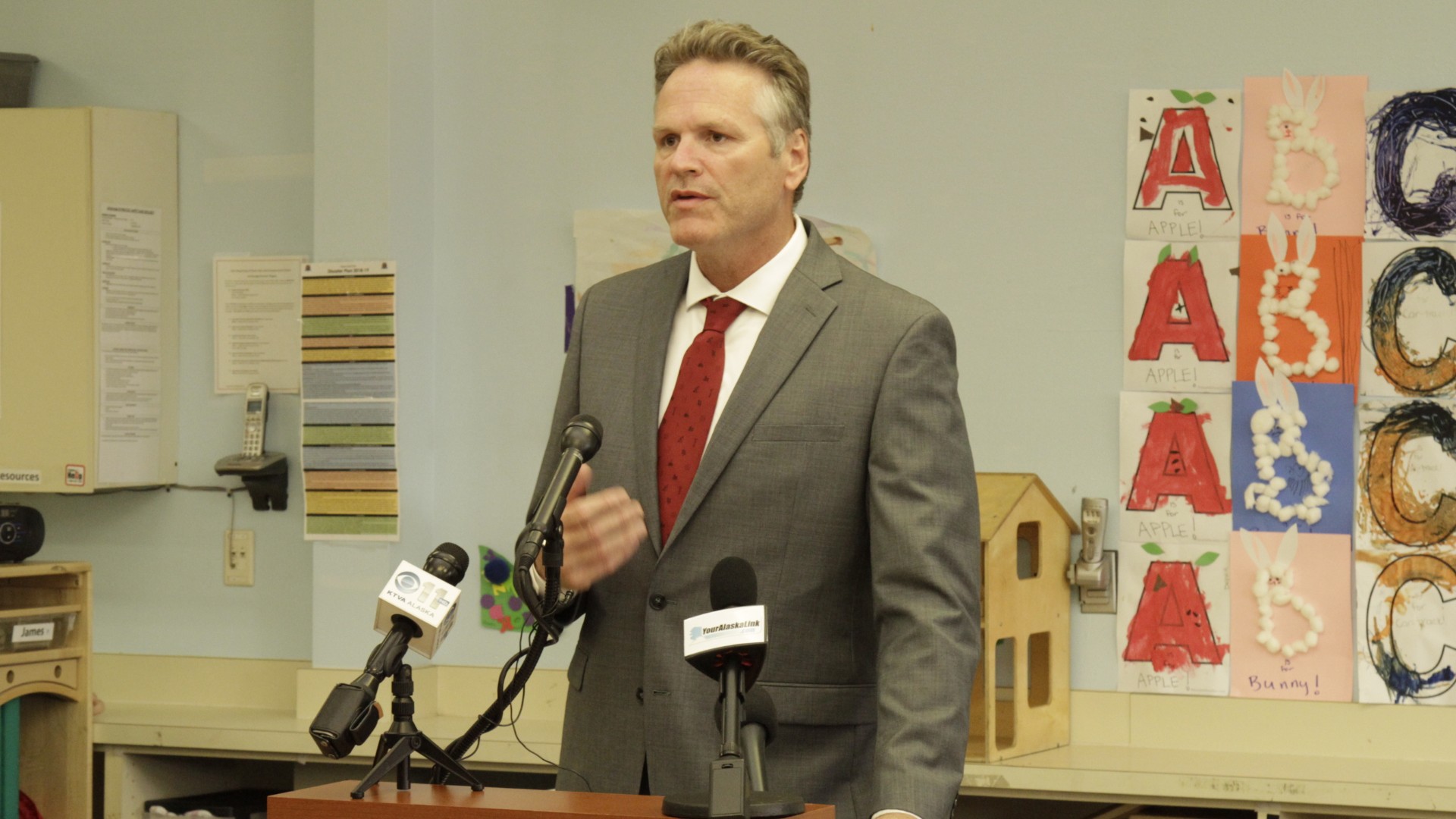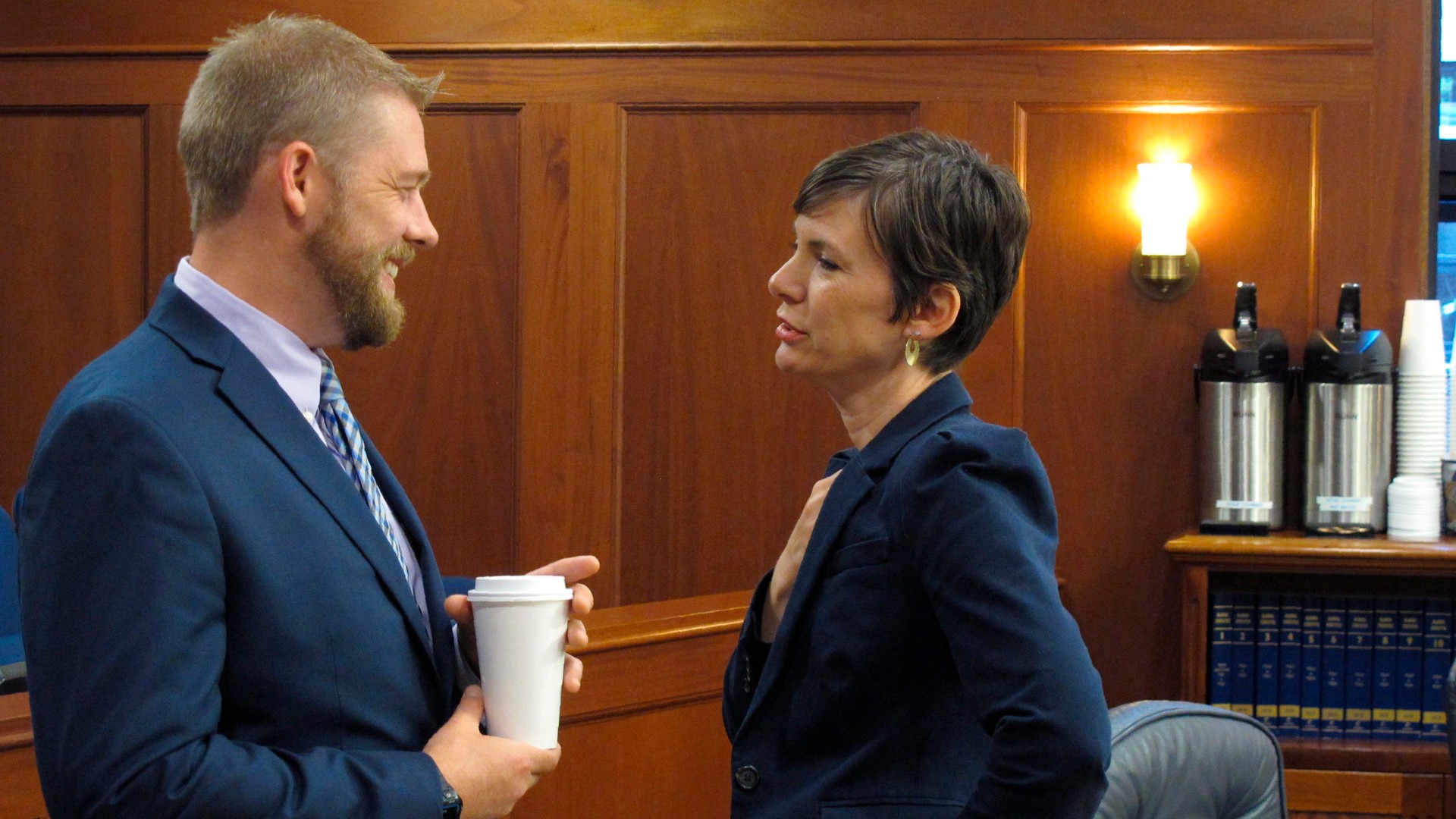Alaska governor cites public response in veto reversals

Alaska Gov. Mike Dunleavy hasn’t wavered from many of his positions since taking office. But that changed this week.
Dunleavy reacted to a public backlash to his budget vetoes by agreeing to reverse significant cuts to senior benefits, pre-kindergarten and the University of Alaska.
The governor said in February that this year’s budget would close the gap between what the state spends and what it brings it, all while paying full permanent fund dividends.
“This has been a longstanding problem in Alaska in terms of getting a budget and fiscal certainty that’s in line with its revenue. And so, we’re going to do it and we are determined that this is the year to fix this budget,” he said in February.
The original proposal would have cut spending by at least $650 million, transferred $520 million from municipal governments, and drawn as much as $350 million from state savings. Another $100 million in projected increases were eliminated.
The House and Senate didn’t agree to most of Dunleavy’s budget. They passed less than third of the cuts he proposed, and rejected shifting money from municipalities to the state.
Dunleavy, a Republican, then vetoed $390 million earlier this summer. But the Legislature voted to restore all but roughly $20 million of that. It relied on reducing dividends to close most of the gap.
Now, Dunleavy is backing off of some of his positions. He said his original budget was intended to start a conversation about what Alaskans value in state government.
“I think what really happened here was, when I finally did drop a budget, with $1.6 billion in reductions, people said, ‘Ah, he’s serious.’” he said. “When the Legislature went through the process of adding back, and then we vetoed again, I think the public then said, ‘He’s really serious about this.’”
Dunleavy said he’s drawn from the public response in deciding against vetoing some items again.
“Because the feedback we got from Alaskans … was that seniors are valued, kids are valued, and Alaska is willing to look at other parts of the budget before we go look at programs that address seniors and kids,” he said.
How far will Dunleavy go?
It wasn’t clear on Wednesday exactly how far the governor will go in reversing his previous positions. And he has to decide whether to sign the reduced dividends into law. But Dunleavy said he still wants to focus on budget cuts over the next year — and he wants $45 million more in cuts to the university budget over two years, on top of $25 million this year. University leaders have signed onto the cuts.
Anchorage Democratic Rep. Ivy Spohnholz said Dunleavy’s original budget started a conversation. But she said the vetoes went further.

“That’s undermining the health of the economy and the progress that we’ve made over the last 50 years,” she said.
Spohnholz was an early supporter of the effort to recall Dunleavy from office. While Dunleavy said the reversals have nothing to do with the recall, Spohnholz said the recall reflects the public opinion he is responding to. She still supports the recall.
“Politicians are leaders but just as much as we’re leaders, we’re also followers,” she said. “We can’t get out too far ahead of the public. And I think what the governor’s learned is that the public doesn’t support the cuts that he’s advanced numerous times this year.”
Spohnholz said Alaska doesn’t have a fiscal crisis. She said the state could maintain programs and have full PFDs if it added revenue.
Dunleavy’s Republican legislative allies played a role in urging the reversals. Anchorage Republican Rep. Lance Pruitt leads the House minority caucus, which raised concerns, including with the senior benefits veto.
“We’ve been engaged with him, and so we’ve been really appreciative that we’ve seen some of these things that he’s been rolling out, that he’s going to preserve them,” he said.
Pruitt said the state still can close the budget gap with spending cuts over time.
“But I think Alaskans have (said), ‘Wait a minute, all at once may be too much for us to handle right now. Let’s step back. Let’s take it at a little bit slower pace,’” he said.
Pruitt said the recall effort is political and could prevent the state government from making progress depending on how its leaders proceed.
Even without some of the governor’s proposed cuts, damage has been done to the state, according to Stephen Haycox, a historian who’s retired from the University of Alaska Anchorage. He said uncertainty and chaos at the university and other state programs will last. And he said the governor inflicted damage when he could have reduced spending in cooperation with state institutions.
“It was Mike Dunleavy who pushed all those upon them, without their consent, without their consultation, without their being asked,” Haycox said.
Dunleavy said his administration will engage with legislators this fall about next year’s budget.
Related stories from around the North:
Canada: MLAs in Canada’s Northwest Territories expect ‘hectic’ sitting ahead of territorial election, CBC News
Finland: Finland’s new gov breezes through no-confidence vote over its agenda, Yle News
Sweden: Swedish government unveils proposed spring budget, Radio Sweden
United States: Alaska capital budget vetoes to hit homelessness, addiction treatment, Alaska Public Media



